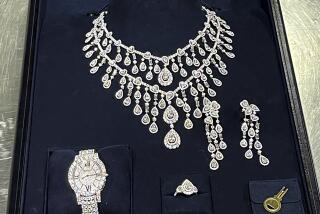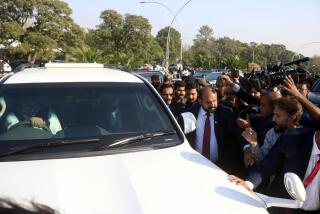Corruption Becomes Major Issue in Pakistan : Third World: Prime Minister Benazir Bhutto’s government permitted a free press only to battle charges of nepotism and financial wrongdoing.
- Share via
ISLAMABAD, Pakistan — Politics and corruption go together in much of the Third World. In Pakistan, they are like hand and glove.
Corruption has been brought into the open by a newly free press and a shift toward democracy after more than a decade of military rule.
Accusations of questionable deals and financial wrongdoing turn up almost daily in newspapers, at news conferences and in speeches.
Prime Minister Benazir Bhutto is not immune.
“The opposition has launched a witch hunt against members of my government and members of my family, and their behavior is nothing short of criminal,” she said in a recent interview. “There is a well-laid conspiracy to hurl one false charge after another, to manipulate the media.
“They are making baseless charges to discredit democracy. We have three courts in our country and people may go to these courts if they have anything.”
But few Pakistanis take accusers to the courts, which act slowly and inflict little, if any, punishment.
Bhutto’s husband, Asif Ali Zardari, is one of the opposition’s main targets.
“I am the soft belly,” he said. “You hit me and you hit her.”
Zardari and Bhutto were married in 1987 while she led the opposition to Gen. Mohammad Zia ul-Haq, the late military president.
“If an individual in her government is accused of being corrupt, the prime minister can get rid of him,” he said. “If they say, ‘The husband of the prime minister is corrupt,’ it echoes throughout the world. The larger the person, the louder the noise.”
Bhutto’s two main rivals in Parliament have filed a lawsuit accusing Zardari of trying to take over 287 acres of Islamabad’s National Park to build a five-star hotel and sports complex in the name of a company based in London.
One of them, Syedda Abida Hussain, said, “The only person listed as its director in London is Ms. Bhutto’s cousin.”
The government accuses its political opponents of obtaining millions of dollars worth of bank loans during the 11 years Zia was in office, then writing them off or repaying them on unusually favorable terms.
Twenty opposition figures, including leaders Nawaz Sharif and Ghulam Mustafa Jatoi, are under government investigation for alleged wrongdoing.
Sharif, chief minister of Punjab province, is accused of obtaining $90 million in loans on special terms, with little collateral. He denies it.
“I offer myself to be investigated by a panel of Supreme Court judges, but along with me, Ms. Bhutto and all politicians under suspicion should also be investigated for corruption,” said Jatoi, leader of Combined Opposition Parties in the National Assembly.
An alliance of 16 parties called the Combined Opposition recently issued an inch-thick collection of documents intended to implicate Bhutto’s 18-month-old government and her family in shady deals.
Allegations range from taking over valuable land and awarding vast mineral concessions in Sindh province, her power base, to building factories with dubious loans and obtaining financial interests in hotels and trade.
Immediately after copies of the dossier were given to Western diplomats and foreign journalists, Bhutto sent four Cabinet ministers to rebut the charges.
“The opposition . . . didn’t even spare Bakhtawar, the baby daughter of the prime minister,” said Khawaja Tariq Rahim, minister of parliamentary affairs and Bhutto’s political trouble-shooter.
The opposition alleged that a well-known family of smugglers in Karachi gave the baby a valuable piece of property as a gift.
“A 4-month-old baby is being dragged by the opposition into vicious propaganda,” Rahim protested.
The opposition accuses senior ministers of selling rice abroad for personal profit, financing a textile mill with a politically influenced loan and borrowing $45 million without collateral to build a cement factory.
Faisal Saleh Hayat, commerce minister and a close Bhutto aide, responded: “Aren’t we the citizens of Pakistan? Why shouldn’t we invest?”
When the government put forth its budget in June, opposition members walked out of Parliament because Ehsanul Haq Piracha, the deputy finance minister, was allowed to present it.
Piracha was accused of granting the license for the new stock exchange in Islamabad to his relatives, and a court ruled he committed “a clear act of favoritism and nepotism.” He denies wrongdoing and has taken the case to the Supreme Court.
There are reports of civilian bureaucrats making money on the purchase of sugar, jetliners and computers; the sale of old aircraft, and contracts for construction and communications projects.
“You name it, we have it,” said a ranking official investigating corruption. “If the government is sincere in prosecuting the corrupt, we can bring up so many cases it will tire the courts.”
Pakistan’s auditor general, Mojahhad Uzair, said in his annual report that irregularities, bungling and fraud were rampant in the government’s accounts.
“The black money feeding Pakistan’s parallel economy was 82 billion rupees ($4 billion) in 1988,” said Uzair, a Harvard-educated economist. “It is spiraling fast, as a result of growing corruption.”
More to Read
Sign up for Essential California
The most important California stories and recommendations in your inbox every morning.
You may occasionally receive promotional content from the Los Angeles Times.













